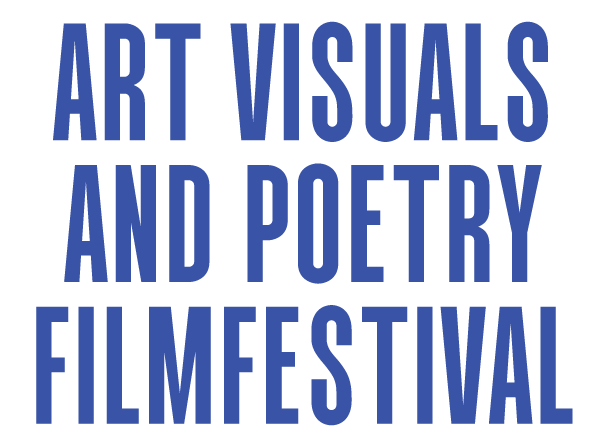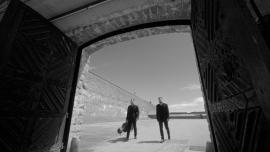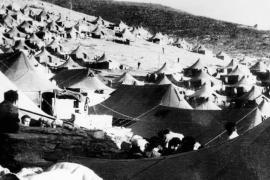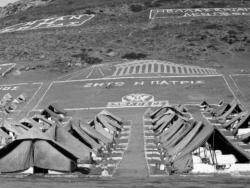Host Country Greece
Lost & Found History - Greek poets arrested
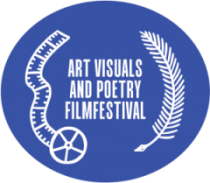 Art Visuals & Poetry Film Festival 2023
Art Visuals & Poetry Film Festival 2023
Curated, international side program with international guests
15. November 2023, 20:00
Location: Factory im Künstlerhaus, Karlsplatz 5, 1010 Wien
Moderation: Sigrun Höllrigl (festival director)
Greece is the birthplace of European poetry. It once again achieved world stardom in the 20th century through Jannis Ritsos, Odysseas Elytis (Nobel Prize 1979), Giorgos Seferis (Nobel Prize 1963), Tassos Livaditis, or Konstantinos Kavafis. What these poets have in common is that all of them were involved in the Greek Civil War in different ways. This war, which emerged from the Resistance movement of World War 2, is today a blind spot in the European historical consciousness. Following two film screenings, we want to explore this loss of memorizing in an international panel discussion entitled "Lost & Found History".
Before that we will show the short film "MAUTHAUSEN | The Fugitive" based on poems by Kambanellis by the directors Panagiotis Kountouras and Aristarchos Papadaniel, both will be traveling to Vienna. The Greek writer Iakovos Kambanellis was a prisoner in the Mauthausen concentration camp. He describes the time of imprisonment, the day of liberation, May 5, 1945, life in the camp in the following months in the poetry collection "Die Freiheit kam im Mai" (Ephelant Verlag Vienna). Afterwards, the Vienna Poetry Film Festival will screen the documentary film by Swiss director Olivier Zuchuat, who will be present in person. "Like Stone Lions at the Entrance of the Night/Comme des Lions de Pierre à l'Entrée de la Nuit" is about the Greek re-education camp Makronissos, where numerous poets were interned.
In 2013, the publishing house Ypsilon Éditeur (Paris) published an anthology of Makronissos poems in French: "L'amertume et la pierre. Poètes au camp de Makronissos 1947-1951", edited and translated by Pascal Neuveu. The book contains poems by Yannis Ritsos, Aris Alexandrou, Tassos Livaditis, Titos Patrikios, Ménélaos Loudémis, Victoria Théodorou, Dimitris Doukaris, Leftéris Raftopoulos, Manolis Kornilios, Kostas Kouloufakos and Tzavalas Karoussos.
The documentary film "Like stone lions at the entrance of the night" by Olivier Zuchuat celebrates its Austrian premiere at the Art Visuals & Poetry Film Festival!
A poetry film based on MAUTHAUSEN Cantata by Mikis Theodorakis (music) & camp survivor and founder of the modern Greek post-war theatre Iakovos Kambanellis (poetry), reinterpreted by Aristarchos Papadaniel (voice) & Aris Zervas (cello). The new MAUTHAUSEN recordings were the last official releases, released with the permission of world-famous Greek composer and political activist Mikis Theodorakis (ZORBA, Z) just one month before his death at the age of 96 in 2021. In this short film we watch part of the rehearsal at the Greek Memorial in Mauthausen, on the 14th of May 2022, preparing for the live performance that took place the day after on the Mauthausen International Liberation & Commemoration Day 2022 in Austria.
The background:
4700 Greeks were interned and tortured in the Austrian Nazi concentration camp Mauthausen. 3700 died in the concentration camp. 1000 Greeks survived Mauthausen.
Between 1947 and 1951, more than 80 000 Greek men, women and children were deported to the isle of Makronissos (Greece) in reeducation camps created to ‘fight the spread of Communism’. Among those exiles were a number of writers and poets, including Yannis Ritsos and Tassos Livaditis. Despite the deprivation and torture, they managed to write poems which describe the struggle for survival in this world of internment. These texts, some of them buried in the camps, were later found. «Like Lions of stone at the gateway of night» blends these poetic writings with the reeducation propaganda speeches constantly piped through the camps’ loudspeakers. Long tracking shots take us on a trance-like journey through the camp ruins, interrupted along the way by segments from photographic archives. A cinematic essay, which revives the memory of forgotten ruins and a battle lost.
Director’s Note
One usually writes poems to celebrate the nature, to express feelings of love or existential sufferings. But rare are the ones who wrote poetry behind barbed wires, under torture. The texts written by the poets of Makronissos rise voices of resistance and bursts of strength; their poetical chronicles of the life of the exiles tell the terror and the survival in this barbaric laboratory entirely devoted to the “mental reprogramming” of communist resistants; they express the ubiquitous fear, the never ending wait, the thirst which consumes the bodies and the fatiguing stone duties. They talk about the nights full of the screams of the those who became insane under the tortures…
When I read those poems, I saw images of a terrifying past that I wanted to confront with the nowadays pictures of the ruins of the camps on Makronissos. I wanted to search in those heaps of stones and concrete for the “prints” of what happened there, to confront those “prints” with the shouting in the loudspeakers that crackle the fascist propaganda, to superpose those mental images with the pictures of the exiles.
The film fights against forgetting, at a time when nauseant nationalist fervours seem to re-emerge in Greece…
